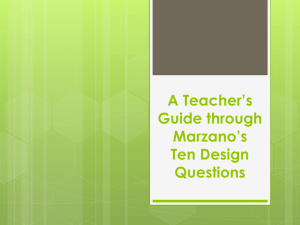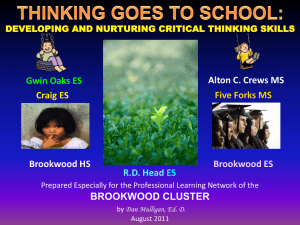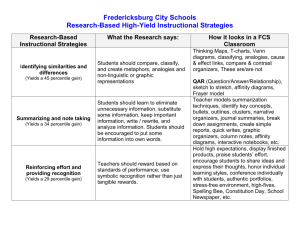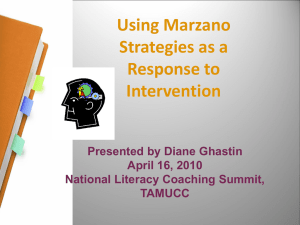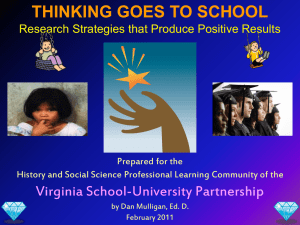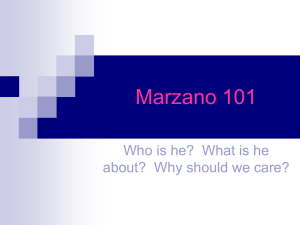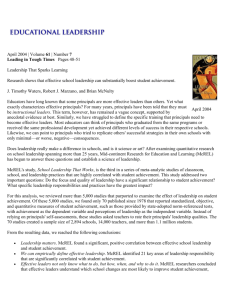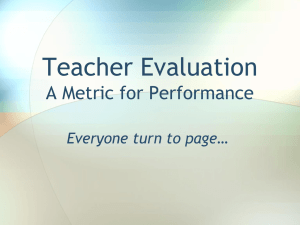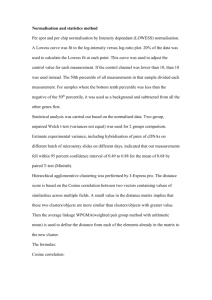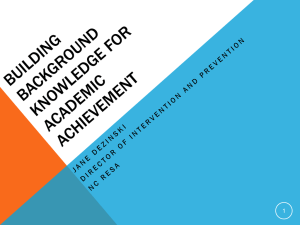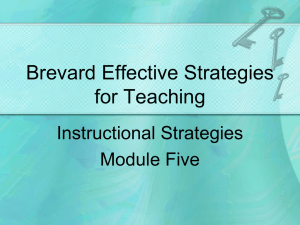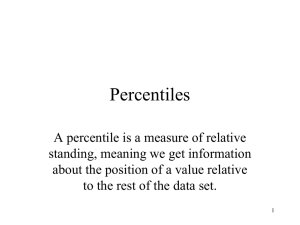McREL Strategies and BTOP
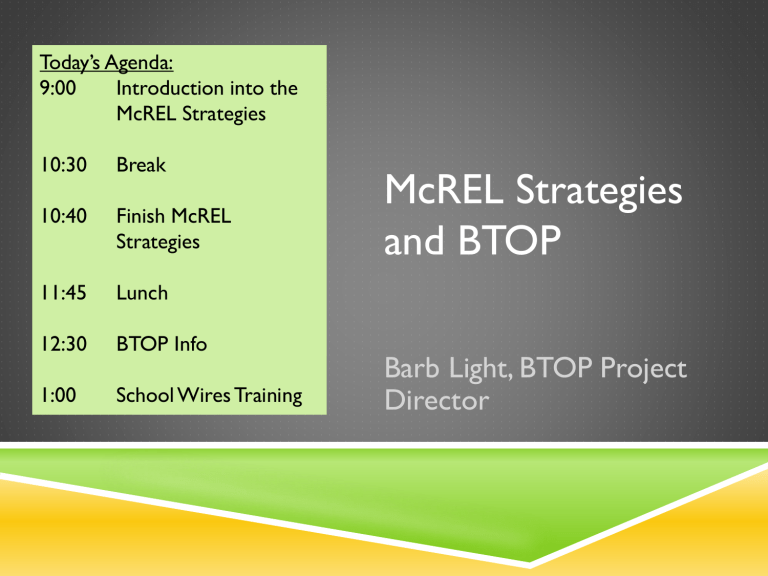
Today’s Agenda:
9:00 Introduction into the
McREL Strategies
10:30 Break
10:40 Finish McREL
Strategies
11:45 Lunch
12:30 BTOP Info
1:00 School Wires Training
McREL Strategies and BTOP
Barb Light, BTOP Project
Director
Why?
These are two regional efforts you may (should?) hear about.
This information should give you an idea of where we have been and where we are headed.
Plus, it’s good stuff!
McREL
It started as for Mid-continent Regional Educational
Laboratory; now it stands for Mid-continent Research for
Education and Learning.
It is a research and development corporation in Denver.
Dr. Robert Marzano, Dr. Debra Pickering, and Dr. Jane
Pollack wrote a book called Classroom Instruction that Works while they worked for McREL.
The strategies come from that book.
They are often referred to as Marzano’s strategies, but technically McREL “owns” them.
Meta-Analysis
Marzano, Pickering, and Pollock wanted to know what strategies were the most effective teaching strategies.
Instead of designing a new study, they searched existing research and identified 9 strategies that work.
Called a “meta-analysis” because they analyzed so many studies to derive the conclusions.
Instructional Strategies that Make a Difference
INSTRUCTIONAL STRATEGY
Identifying Similarities and Differences
Summarizing and Note Taking
Reinforcing Effort and Providing Recognition
Homework and Practice
Nonlinguistic Representation
Cooperative Learning
Setting Objectives and Providing Feedback
Generating and Testing Hypotheses
Questions, Cues, and Advance Organizers
27
23
23
22
PERCENTILE GAIN
45
34
29
28
27
Identifying Similarities and Differences
45 percentile gain compared to classrooms that did not use it
Compare & contrast
Analogies
______________ is to _____________ as ____________ is to ____________
Noun is to verb as shopping is to money.
Similes and metaphors
The cell nucleus is like a human brain because _______________
Classifying or grouping things
Try It!!
Think of something you will be teaching this year and figure out how you could use one of the identifying similarities and differences strategies we just discussed to deepen the learning for your students.
Think, pair, share
From: Marzano, R. J. The art and science of teaching. (2007).
<http://www.ascd.org/publications/books/107001/chapters/what-will-i-do-to-help-studentspractice-and-deepen-their-understanding-of-new-knowledge%C2%A2.aspx>
Summarizing and Note Taking
34 percentile gain
These are skills that must be taught with focus on deep knowledge over focus on the process.
To summarize some material must be kept, some must be reworded, and some must be deleted.
Think Twitter.
Reciprocal teaching
Main point or most important idea or one thing you learned
Note taking can be words, pictures, diagrams, etc.
Model it
Big picture sets the stage for learning and allows for connection to background knowledge
Layering information builds understanding piece by piece
Try It!!
Think of something you will be teaching this year and figure out how you could use one of the strategies we just discussed to deepen the learning for your students.
Discussion Question: How can you make note taking fun/engaging/worthwhile/meaningful for students?
Reinforcing Effort and Providing Recognition
29 percentile difference
People like to be recognized for EFFORT and SUCCESS.
Believe it or not, research shows that students do not always connect effort to success. You should clearly state that effort matters and leads to success in education.
Students can track their own efforts and see if increased efforts = increased success.
Rewards – most effective when linked to meeting a standard; research shows that specific task related verbal praise is much more motivating to students than candy or even money.
Try It!!
Think of something you will be teaching this year and figure out how you could use one of the strategies we just discussed to deepen the learning for your students.
Brainstorming Session: List all the ideas you have for reinforcing effort and providing recognition.
Homework and Practice
28 percentile difference
Let’s get real about homework and its role in education:
Do kids have to hate homework?
Will kids do homework?
Yes, if it is interesting or worthwhile.
No, if it is punishment or boring.
Homework and Practice
What is effective homework?
Amount of homework = 10 minutes per grade of student maximum
(3rd grader = 30 minutes max)
Homework is LEAST effective in grades middle grades (4 th -8 th grades).
Minimum parent involvement makes for better homework.
Purpose of homework must be identified and articulated.
All homework must be evaluated somehow (graded, commented on, etc.). If they do it you need to acknowledge their efforts and offer specific feedback.
Homework and Practice
Think, pair, share: What will you do to make homework an effective part of your student’s education?
Homework and Practice
Practice can lead to mastery.
What is mastery and when is that our goal for students?
Is there a difference between teaching skills and teaching knowledge?
What skills will you have to teach?
How will you encourage students to practice?
How will you encourage students to practice knowledge?
Nonlinguistic Representation
27 percentile gain
Simple idea – have students draw pictures, create models of or act out concepts. Graphic organizers are great, too!
http://www.youtube.com/watch?v=YxsEYWHb4i8&featu re=plcp http://www.youtube.com/watch?v=UVavAC3Tclk&featur e=plcp
Picture was done by a teacher to represent the concept of sentence fluency in writing.
Cooperative Learning
27 percentile gain
Grouping by ability is less effective than mixed ability grouping and low achieving students learn less in a low ability group than when working on their own.
Group sizes: 3-4 students/group is most effective; pairs are next most effective, and 5 or more students/group is ineffective
What are some creative ideas you have seen or have about cooperative learning?
Setting Objectives and Providing Feedback
23 percentile gain
Gosh, you mean, setting goals and letting students know if they are headed the right direction is effective education? Rubrics actually work?!?
Put the standard on the board!! (Or else you lose points when your principal walks through your classroom.)
Feedback should be corrective in nature – specifically what student is doing correctly and specifically what student is doing incorrectly – focus on the task or standard to avoid student’s taking it personally.
Feedback should be timely. You have certainly had a teacher or professor who took forever to grade your work. How effective was that for you?
Students can provide feedback for themselves and should be part of this process! Thoughts on how to do this?
Generating and Testing Hypotheses
23 percentile gain
Making an educated guess and then figuring out if you are right creates meaningful learning. Some students love the idea of challenging themselves. It’s key to some students that it’s OK to be wrong in your hypothesis.
Predicting what will come next in a story
Science class experiments; science fair
Relationships and problem solving in math
Historical investigations of events – plausible scenarios for events that are debatable
Can be used in any class
Key: have students explain their hypotheses so you can understand their thought processes (be on the lookout for misconceptions), how they tested them, and what they learned from all this.
Questions, Cues, and Advance Organizers
22 percentile gain
Set the stage for learning
Students want to know why they should learn today’s lesson.
Students want to know how today’s lesson connects to what they already know.
What’s the big picture??
Use questions, cues, and advance organizers to set the stage.
Questions, Cues, and Advance Organizers
How did I do this today?
How will you do this in your classroom?
BTOP
Broadband Technology Opportunities Program
Federal grant (ARRA funds) awarded to EUPISD
$3.165 million granted + 28% match = $4.4 million project
Jobs provided: project director, instructional technologist, 3 techs, half time community outreach specialist
Provided netbooks for all 7 th -12 th graders in region, teacher
PD, community outreach events about broadband use
Technology and 21 st century education is a big deal in our schools!
So, what can you do with technology?
Instructional Strategies that Make a Difference
INSTRUCTIONAL STRATEGY
Identifying Similarities and Differences
Summarizing and Note Taking
Reinforcing Effort and Providing Recognition
Homework and Practice
Nonlinguistic Representation
Cooperative Learning
Setting Objectives and Providing Feedback
Generating and Testing Hypotheses
Questions, Cues, and Advance Organizers
27
23
23
22
PERCENTILE GAIN
45
34
29
28
27
